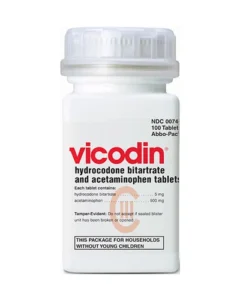Short-Term Relief Can Lead To Long-Term Addiction Dangers
What are the key risks associated with Vicodin that users should be aware of, despite its effectiveness for short-term pain relief? Our counsellors are here to help you today.
FREE ASSESSMENT082 747 3422Vicodin, a pain relief medication combining hydrocodone and acetaminophen, has a significant risk of addiction and dependency. Hydrocodone, an opioid pain reliever, alters brain response to pain, while acetaminophen aids in reducing fever and relieving mild pain. While effective for short-term pain management, Vicodin misuse or high-dose use can lead to addiction.

The U.S. Drug Enforcement Agency reclassified Vicodin as a Schedule II controlled substance in 2014 due to its high potential for abuse and addiction. Long-term use leads to tolerance, requiring more medication for the same effect, which can accelerate physical dependence and intense withdrawal symptoms upon cessation. Vicodin addiction or opioid use disorder, is a chronic brain condition marked by compulsive opioid use despite adverse consequences.
Treatment for Vicodin addiction often involves medication-assisted treatment (MAT) and behavioural interventions like psychotherapy and counselling. Rehabs and treatment centers provide tailored care, therapy and support with options including detoxification, individual and group therapy, addiction counselling and aftercare support.
Vicodin’s addictive nature stems from its impact on the brain’s opioid receptors and the release of dopamine, triggering a sense of euphoria and the brain’s desire to replicate that feeling. This leads to a rewiring of brain chemistry making it difficult to control cravings.
Vicodin addiction can start from a prescription or recreational use and even as a substitute for other drugs. To minimise addiction risk, it’s important to use Vicodin only as prescribed by a doctor.
Vicodin abuse has several health consequences, including liver and heart disease, weakened immune system, high blood pressure, various cancers, mental health disorders and increased risk of heart attack and stroke.
Awareness of Vicodin’s dangers has grown, leading to more cautious prescribing by medical professionals and public education efforts to highlight the risks and encourage early intervention and treatment. Understanding addiction signs, such as growing tolerance, strong urges to use despite negative consequences and prioritising drug use over personal responsibilities, is essential for timely help.
What are the key risks associated with Vicodin that users should be aware of, despite its effectiveness for short-term pain relief? Get help from qualified counsellors.Short-Term Relief Can Lead To Long-Term Addiction Dangers
How does isolation affect emotional well-being and mental health outcomes for individuals facing addiction or mental health challenges?
What are the most effective counselling approaches used in addiction treatment, and how do they align with the mental health model of addiction?
Inpatient Rehab
Rehab care is a good option if you are at risk of experiencing strong withdrawal symptoms when you try stop a substance. This option would also be recommended if you have experienced recurrent relapses or if you have tried a less-intensive treatment without success.
Outpatient
If you're committed to your sobriety but cannot take a break from your daily duties for an inpatient program. Outpatient rehab treatment might suit you well if you are looking for a less restricted format for addiction treatment or simply need help with mental health.
Therapy
Therapy can be good step towards healing and self-discovery. If you need support without disrupting your routine, therapy offers a flexible solution for anyone wishing to enhance their mental well-being or work through personal issues in a supportive, confidential environment.
Mental Health
Are you having persistent feelings of being swamped, sad or have sudden surges of anger or intense emotional outbursts? These are warning signs of unresolved trauma mental health. A simple assesment by a mental health expert could provide valuable insights into your recovery.
Is My Loved One Addicted?
Your responses are private and not stored.
It’s Professional.
Clinically grounded
Clear, practical guides on addiction and recovery, based on recognised treatment principles and South African experience.
Therapy for addictionIt’s Affordable.
Straight talk on costs
We unpack typical fees, medical-aid issues, and funding options so you can compare treatment choices without sales pressure.
Paying for treatmentIt’s Convenient.
On your terms
Short explainers, checklists, and FAQs you can read, save, and share in your own time, from any device.
What to expect in rehabIt’s Effective.
Better decisions
We focus on evidence-based guidance and honest discussion of risks, relapse, and family impact to support long-term recovery.
Evidence-based















